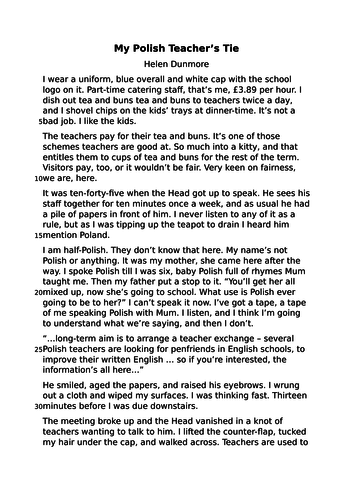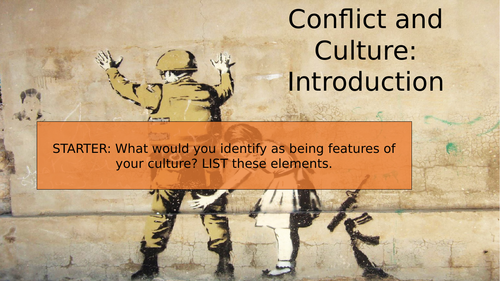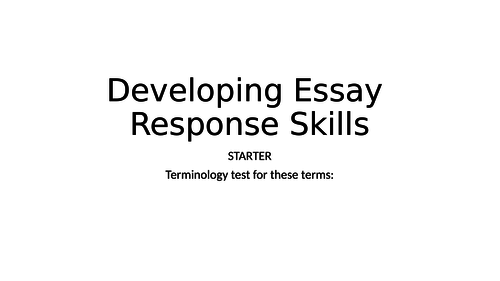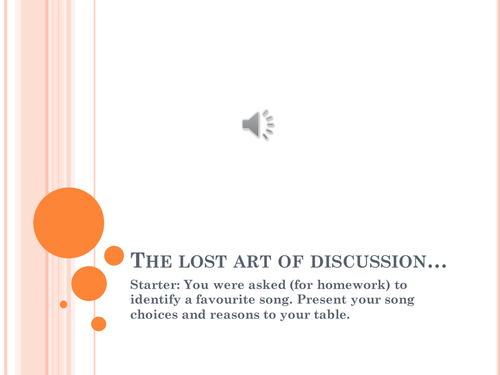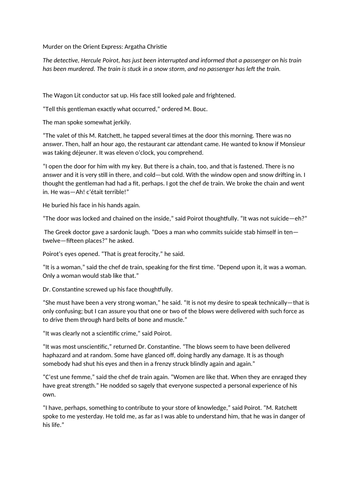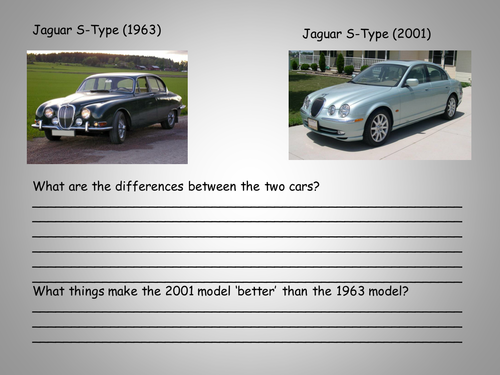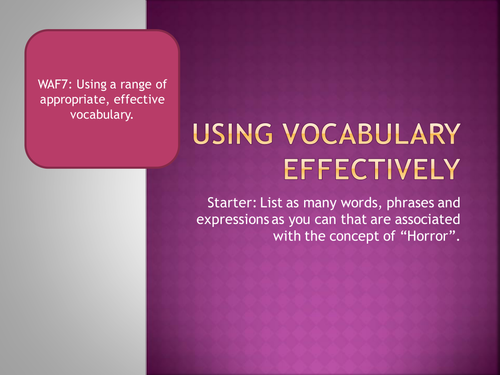
236Uploads
546k+Views
1358k+Downloads
All resources

AQA English Language Paper 1 Section A Mock Exam - My Polish Teacher's Tie
I've found another use for all that knowledge we have about the old AQA English Lit anthology (The Sunlight on The Grass anthology). I have started to turn them into English Language Paper 1 Section A Mock Exams!
This is one of them. There is no mark scheme, but if you use the Paper 1 mark scheme from the AQA website you should be fine.
This one uses the opening of My Polish Teacher's Tie.

KS3: Conflict and Culture Poetry - a stimulus for Creative Writing
I've had a lot of fun teaching these lessons. Essentially, the idea is you spend a lesson exploring a poem and then a creative angle has been drawn from the text to inform the creative writing lesson that follows. Each of the creative writing lessons assumes a two hour window. A simple scheme, but I've found it to be rather effective.
Bundle

AQA English Language - The Complete Approach
A collection of all of my English Language resources. This also includes a spreadsheet for the tracking of the course.

AQA English Literature Poetry Knowledge Tracker Spreadsheet
A useful little tool. It allows you to RAGB(red, amber, green, blue) your students understanding/annotations of the 15 Power and Conflict poems in the AQA anthology. Also, it provides you with a poem by poem breakdown of your classes understanding/quality of annotations so you can see where the gaps are all the clearer.
The spreadsheet is set up for a class of up to 40, but the coding can easily be altered to allow for a whole year group.

AQA English Language and Literature: Developing essay response skills to the Paris Anthology section
This is my attempt to engage and develop my Year 12s academic voices in their Paris Anthology related essay responses. The main issue my class had seemed to focus upon when and where to start. What I do is show them how they can place a particular emphasis on one of several potential areas of focus initially. I show them how they could use Mode, Audience, Purpose, each of Grice’s Maxims and each of the different levels of language as a starting point for an analytical response. The attached word document appears to be an “essay”.It isn’t. It’s the collected starting points placed in one document so that the students can focus more on the “how you do it” instead of trying to copy down the best bits.
It worked reasonably well and is suited for a class with similar needs. Hope you find this useful.

KS3: SPaG Understanding a Text Lessons (Using Michael Grant's "Gone" series as a stimulus)
SPAG lessons can get a little flat at times. These are the worksheets I’ve designed to use with my own SPAG group. It is designed to be taught in tandem with a Dystopian Fiction SoW that ends with a reading assessment. Specifically, these lessons focus on an extract taken from Michael Grant’s “Gone” - all extracts taken from the first chapter. The aim is to develop an increased understanding of each text through the asking of more and more complex questions. The tasks can be sat as part of a lesson (I reckon they’ll take most groups between 10-30 minutes depending on the groups setting), or make ideal homework and/or extension tasks.
At the moment, the resources are set up to be taught to lower set year 7 students. But, it won’t be too hard to change the tasks to more suitable ones for any set.
UPDATE: I’ve included some versions that are more suited to be printed out. They have some basic RAG feedback grids on the back with some generic targets.

Discussing and Listening
Four lessons that focus on improving your students abilities surrounding discussion and listening - somewhat lost art forms. Numerous discussion topics at group and whole class level.

KS3: Creative Writing (linked to A Midsummer Night's Dream)
After teaching content related to AMND, we had changed direction and ended up doing some creative writing. These lessons build on some top end creative skills.

AQA English Language Paper 2 Section A Revision Lesson
A single power point designed to be taught as a walking-talking mock examination. This can extend over several lessons - I predict you'll need at least three to do this justice. The source materials are included.

KS3: Murder on The Orient Express Language Task - Method Focus
Using a format that proved successful in the KS4 arena, I’ve adapted the thinking to apply to an AQA English Language P1 Q2/P2 Q3 style task that would fit for a higher ability top set KS3 class.
The approach is to initially read the extract then to specifically identify concepts that relate to a language focused task, followed be explicitly identifying language based methods and incorporating into a response.

KS3: Born a Crime - Structure Focus
A lesson take from a collaborative scheme of work. The lesson focuses on the quite excellent Born A Crime by Trevor Noah. The focus is developing an initial understanding of South Africa, then Trevor Noah himself, before focusing in on the context surrounding the story itself.
After, the focus switches to analysing the structural choices made in the extract.
Additionally, I’ve included a useful little follow up lesson where the focus ins to build a piece of creative writing that follows a specific structural path.

AQA English Language Data Collation Spreadsheet aka "The Machine"
Attached is a spreadsheet that does an awful lot of work for you. To summarise, it does the following:
Allows for easy collation of GCSE Language marks on a paper by paper basis AND as a whole examination
Allows for easy identification of various student demagraphics - EAL, PP and so on
Allows you to measure progress against students best, average and last marks across both papers
Works out "how many marks" until you hit target grades for individual students
Colour codes grades and marks to allow for at a glance progress checks
Once you buy this spreadsheet, you will not need to get another LANGUAGE spreadsheet. The document contains instructions on the ARRAY tab as to how to update .
Oh, and if you do get this, I suggest you LOCK the individual spreadsheets ASAP: the document is set up to allow you to do this and still enter the data, you just won't be able to accidentally delete any of the coding, thus removing any brain overloads that might ensue.
I am using this at my current school and there are several other schools who are using this system with good reports.
Happy spread-sheeting!
PS - Yes, there is a page that reads exactly the same but for a version that caters for the AQA Literature course. The spreadsheets are different. Here's the link/address to the LITERATURE version:
https://www.tes.com/teaching-resource/aqa-english-literature-data-collation-spreadsheet-aka-the-machine-11405407

AQA A-Level English Language and Literature: Othello - Lesson 1
A reintroduction lesson that should be taught with the understanding that the students have read the text beforehand. Designed as an entry point into year 13; ideal for new teachers looking to get the measure of a new class (as in my case).
I found this lesson particularly useful when combined with FAR marking the material surrounding the quotations.
You should view this as a starting point - future lessons will get much more specific.
Bundle

AQA English Literature Paper 1 Bundle
Jekyll & Hyde, A Christmas Carol and Romeo & Juliet resources PLUS a spreadsheet to track them all.

AQA English Language Paper 1 Resources - based upon 100% Perfect Girl
A few things first: the mock exam can be found elsewhere on in my resources and I base the lessons off a similar series of lessons focused on Anil. The difference here is that these lessons are very much targeting higher ability students - all of the success criteria draws from the top end of the mark criteria.
I found this series of lessons to be really useful as a way of establishing the skills required to answer each of the Section A questions. The lessons focus less on exam strategy and more on understanding what is required in relation to each question. The kids found it useful.

AQA A-Level English Language and Literature: The Tollund Man
A lesson I put together to assist with the teaching of The Tollund Man. Pay attention to the notes element of the power point. I source a lot of information from a lot of different places here.
Also, the essay questions at the end tee up nicely into a lesson focusing on comparison.

AQA A-Level English Language and Literature: Othello - Lesson 2 (Soliloquies)
My second lesson. Here, I focus almost entirely on ACT 2 SCENE 1 and Iago's soliloquies therein. The notes element of the power point pulls a lot of thinking together from across a lot of sources - you'll need these notes to flesh out the tasks. I tie it up with an exam style question at the end focusing on what we can infer about attitudes to women. Quite pleased with how this looks and how it goes.

Cars and car development
A simple starter task getting students to compare cars across history and focusing on the recently redeveloped S-Type Jaguar.

Animal Farm KS3 resource pack
I've taught this to top set year 8 and year 9 - had more success with the year 9s to be honest, but I think this would work with year 8s further in to the year. This was a series of lessons taught over the enormous 8 week half term. Hope the resources are useful to you!

Gothic Creative Writing KS3 Resource Pack
MASSIVE success with this scheme. Trouble is, what I can’t get on here is the music files I downloaded and threaded into the lessons. If you want to do this, use a site like keepvid.com to download some sinister music - I used the little girls song from ‘The Ring’ and a series of songs from the original QUAKE video game soundtrack (one is literally just a whisper getting louder and louder). I played these sounds over the top of the creative writing assessment and got a decent response (true, one or two of the kids MAY have nightmares…). Best of luck!

